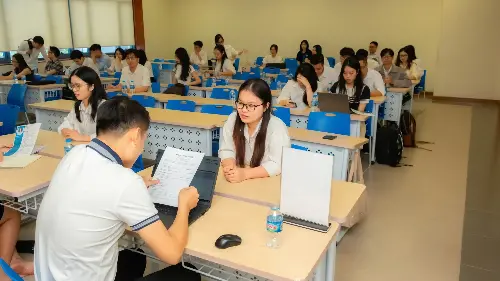To increase the “practical” quality for students in business and management training programs, the contribution of enterprises is a factor that universities attach great importance to. According to many enterprises, having good professional knowledge in the training program is not enough, but schools and enterprises need to coordinate more deeply with each other in improving the quality of student internships.
SV GIVE UP FOR VERY "CHILDREN" REASONS
According to Mr. Phan Minh Chinh, Chairman of the Board of Directors of Pro Sports Group, a good training program is one that helps students have the ability to "practice" when doing internships at enterprises as well as later when participating in the labor market. The question is how can students both learn professional knowledge and "practice"? The answer involves all three sides: students, schools, and enterprises. From the enterprise side, the answer is clear to everyone: creating conditions for students to do internships. "Letting students come just to show off, and then at the end of the semester giving them a certificate of internship is not difficult. The problem is how, during that short internship period, we must share, create and nurture in them the motivation to strive and the desire to excel," Mr. Chinh stated his opinion.

High-quality marketing management students of National Economics University on a business tour
According to Mr. Chinh, Pro Sports Group is a company that accepts many interns, often creating opportunities for students to learn. They have the right to be their own boss, the right to experience without having to pay the price, because the company has paid that price for them. But do they really have the spirit of ownership? Our students today basically have very good qualities. They are often very agile, catch on extremely quickly, but get bored quickly. Therefore, the concern of business leaders like him is to cultivate in students with a burning desire the "core" of determination. "Where there is determination, there is a path. How can we, in the training process, in addition to imparting professional knowledge, new knowledge (English, IT...), cultivate in them determination, the mindset ready to face challenges", said Mr. Chinh.
Ms. Bui Thi Hanh Hieu, General Director of Bao Minh Agricultural Processing Trading Joint Stock Company, also said that her company has a number of projects with the participation of students. Basically, the students are intelligent, well-trained, dynamic, and open-minded, but there are also some shortcomings. “They need to cultivate more morality, determination, and intelligence. These three factors are very important, because there are businesses that are very open-minded and welcome students, but many students give up halfway through the project. There are very “childish” reasons. We advise them that when they go to work, they should determine that they will receive a salary, must work very seriously, and they are all over 18 years old,” Ms. Hieu shared.
NGETTING ACQUAINTED WITH THE BUSINESS ENVIRONMENT FROM YEAR 2
Mr. Nguyen Huu Hieu, founder and CEO of FiinGroup Corporation, reflects the reality that many students are still confused after graduating from school. They cannot imagine what it will be like to work in an office environment. They cannot imagine what the human resource management system will be like, who they will work with; who their colleagues and associates are; how a working day will take place, what the work discipline requirements are... "It seems that in the output standards of current training programs, we have not paid attention to the practical experience of students. For example, there should be regulations during the school year, how many hours and how many days each student needs to study in the office or in enterprises... In my opinion, this requirement is very important in training", Mr. Hieu noted.
Ms. Nguyen Thi Dung, Director of D&P Vietnam Tax Consulting and Agency Co., Ltd., suggested that universities should create opportunities for students to have internships and practical experience early, rather than waiting until the final year. As soon as students are in their second year, schools can let them get acquainted with the corporate working environment, even work at the company for a period of time (maybe a week, a month, or even a quarter) so that students can approach and understand the working process and the culture of the company. Continuing to have such experiences in the third and fourth years, when they graduate, they will be able to fully adapt to the real environment.
Ms. Nguyen Thi Thu Hai, Director of LCFoods Company Limited, proposed that when a business accepts interns, there must be a commitment between the business and the school, and the business and the student. The business needs to invest resources (finance) and human resources to create conditions for students to do internships. The school needs to increase the time for lecturers, so that lecturers can accompany the business during the student internship. As it is now, when students do internships, lecturers only "attach" themselves to the business in the introductory part and consider their task completed, which will not be effective.

Students participate in an activity during the internship day.
CNEED TO CREATE CONDITIONS FOR STUDENTS TO MAKE… MISTAKES
According to Mr. Trinh Van Tuan, Chairman of the Board of Directors of PC1 Group Joint Stock Company, activities such as internships, doing major assignments, graduation theses, etc. are the process of preparing for life, but the majority of students are still not responsible for these activities. Internships of students at enterprises are still heavy on formality and not of high quality. The process of doing major assignments of students has not gone into the essence. When doing assignments, they have not chosen exercises that are close to the program they are working on.
“Learning goes hand in hand with practice. Right from the moment you choose a business model for your internship, you also need to have a practical choice with the job you intend to pursue. Your graduation project also needs to be close to your internship. But many students do not do that. I think it is inappropriate, very time-consuming and wasteful, and does not bring benefits. Therefore, the training process not only provides students with professional knowledge but also helps them have the right perception, so that they can soon determine what they want to do in the future, to study and practice in a practical way,” Mr. Tuan shared.
According to Mr. Nguyen Huu Hieu, universities need to create an experimental environment for students in the space of university lecture halls. Participants are not under KPI pressure (performance pressure). They can try, make mistakes, and make mistakes quickly so that they can finish and do something else. In that environment, they are immersed in a simulated environment, to create new products, initiatives, and services for society. "Universities create conditions that allow students to experiment in a certain environment, geographical space, and time, and there, if they make mistakes, it's okay. After many experiments, they will create useful things for the market," said Mr. Hieu.
Add new content to the training program
To increase the "practical" nature of training programs, from 2023, the University of... Economy The National Economics University has organized a regular industry conference every year, a forum to receive comments and suggestions from partner businesses. At this year's conference, held last weekend, the National Economics University said that since last year's conference, the school has added some new content to the training program to teach students of the 66th course (the course to be enrolled in 2024).
For example, the National Economics University has included in all regular university training programs (applied from course 66) the subject "Practical Topic", consisting of 4 credits, to increase the practical content in the training process; or the school has also included in the training program a new subject "Basic Data Science in Economics and Business", consisting of 3 credits, with training content suitable for students of each training group, for all new students.
Sources: https://thanhnien.vn/de-sinh-vien-ra-truong-het-lo-ngo-185241104190544128.htm